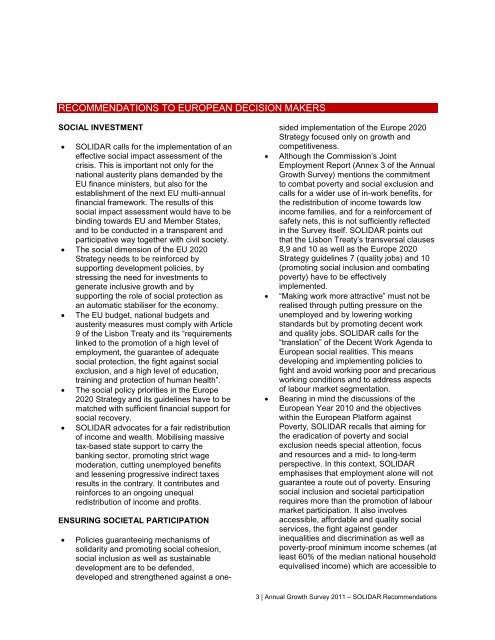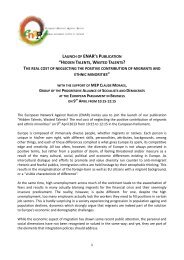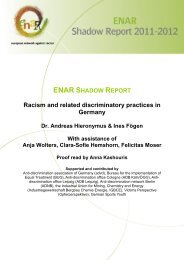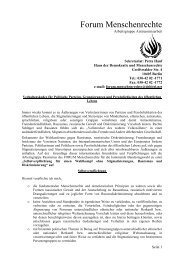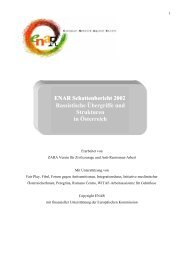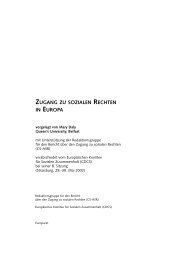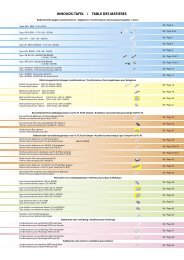Annual Growth Survey 2011 ? SOLIDAR Recommendations
Annual Growth Survey 2011 ? SOLIDAR Recommendations
Annual Growth Survey 2011 ? SOLIDAR Recommendations
You also want an ePaper? Increase the reach of your titles
YUMPU automatically turns print PDFs into web optimized ePapers that Google loves.
RECOMMENDATIONS TO EUROPEAN DECISION MAKERS<br />
SOCIAL INVESTMENT<br />
<strong>SOLIDAR</strong> calls for the implementation of an<br />
effective social impact assessment of the<br />
crisis. This is important not only for the<br />
national austerity plans demanded by the<br />
EU finance ministers, but also for the<br />
establishment of the next EU multi-annual<br />
financial framework. The results of this<br />
social impact assessment would have to be<br />
binding towards EU and Member States,<br />
and to be conducted in a transparent and<br />
participative way together with civil society.<br />
The social dimension of the EU 2020<br />
Strategy needs to be reinforced by<br />
supporting development policies, by<br />
stressing the need for investments to<br />
generate inclusive growth and by<br />
supporting the role of social protection as<br />
an automatic stabiliser for the economy.<br />
The EU budget, national budgets and<br />
austerity measures must comply with Article<br />
9 of the Lisbon Treaty and its “requirements<br />
linked to the promotion of a high level of<br />
employment, the guarantee of adequate<br />
social protection, the fight against social<br />
exclusion, and a high level of education,<br />
training and protection of human health”.<br />
The social policy priorities in the Europe<br />
2020 Strategy and its guidelines have to be<br />
matched with sufficient financial support for<br />
social recovery.<br />
<strong>SOLIDAR</strong> advocates for a fair redistribution<br />
of income and wealth. Mobilising massive<br />
tax-based state support to carry the<br />
banking sector, promoting strict wage<br />
moderation, cutting unemployed benefits<br />
and lessening progressive indirect taxes<br />
results in the contrary. It contributes and<br />
reinforces to an ongoing unequal<br />
redistribution of income and profits.<br />
ENSURING SOCIETAL PARTICIPATION<br />
Policies guaranteeing mechanisms of<br />
solidarity and promoting social cohesion,<br />
social inclusion as well as sustainable<br />
development are to be defended,<br />
developed and strengthened against a one-<br />
sided implementation of the Europe 2020<br />
Strategy focused only on growth and<br />
competitiveness.<br />
Although the Commission’s Joint<br />
Employment Report (Annex 3 of the <strong>Annual</strong><br />
<strong>Growth</strong> <strong>Survey</strong>) mentions the commitment<br />
to combat poverty and social exclusion and<br />
calls for a wider use of in-work benefits, for<br />
the redistribution of income towards low<br />
income families, and for a reinforcement of<br />
safety nets, this is not sufficiently reflected<br />
in the <strong>Survey</strong> itself. <strong>SOLIDAR</strong> points out<br />
that the Lisbon Treaty’s transversal clauses<br />
8,9 and 10 as well as the Europe 2020<br />
Strategy guidelines 7 (quality jobs) and 10<br />
(promoting social inclusion and combating<br />
poverty) have to be effectively<br />
implemented.<br />
“Making work more attractive” must not be<br />
realised through putting pressure on the<br />
unemployed and by lowering working<br />
standards but by promoting decent work<br />
and quality jobs. <strong>SOLIDAR</strong> calls for the<br />
“translation” of the Decent Work Agenda to<br />
European social realities. This means<br />
developing and implementing policies to<br />
fight and avoid working poor and precarious<br />
working conditions and to address aspects<br />
of labour market segmentation.<br />
Bearing in mind the discussions of the<br />
European Year 2010 and the objectives<br />
within the European Platform against<br />
Poverty, <strong>SOLIDAR</strong> recalls that aiming for<br />
the eradication of poverty and social<br />
exclusion needs special attention, focus<br />
and resources and a mid- to long-term<br />
perspective. In this context, <strong>SOLIDAR</strong><br />
emphasises that employment alone will not<br />
guarantee a route out of poverty. Ensuring<br />
social inclusion and societal participation<br />
requires more than the promotion of labour<br />
market participation. It also involves<br />
accessible, affordable and quality social<br />
services, the fight against gender<br />
inequalities and discrimination as well as<br />
poverty-proof minimum income schemes (at<br />
least 60% of the median national household<br />
equivalised income) which are accessible to<br />
3 | <strong>Annual</strong> <strong>Growth</strong> <strong>Survey</strong> <strong>2011</strong> – <strong>SOLIDAR</strong> <strong>Recommendations</strong>


